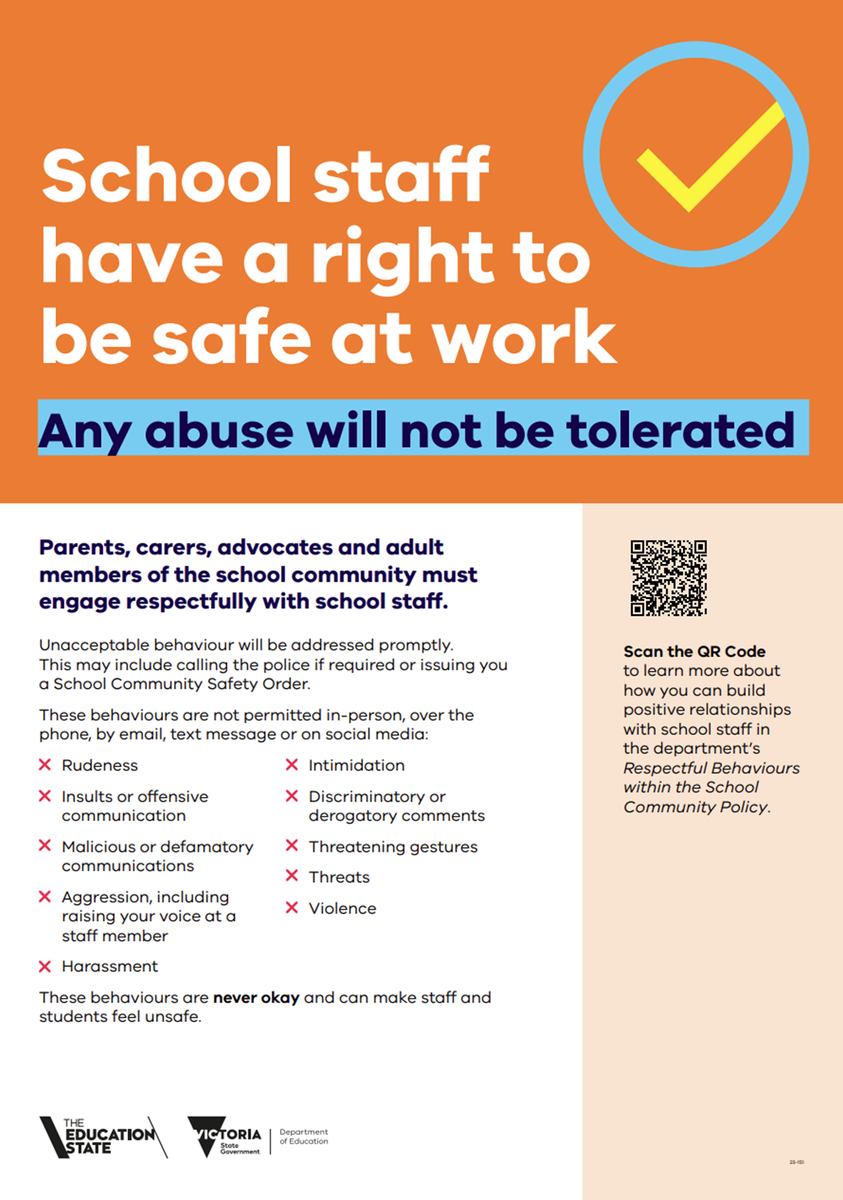Annual Reminders
Shane Kruger, Principal

Annual Reminders
Shane Kruger, Principal
Mobile Phones
A reminder that the Department of Education has in place a mobile phone ban that requires students who bring mobiles phones to school to have them switched off and securely put away during school hours. The Department is requiring all schools to ensure this ban is in place and enforced from the start of the 2024 school year. The ban applies equally to all government schools right across the state.
This helps ensure that school is a learning environment free from unnecessary distractions and disruptions. By ensuring mobile phones are kept away at recess and lunch times, students can interact with each other face-to-face, without the distractions and social pressures that mobile phones can cause. I ask for the support of all our families, staff and students in continuing to support the implementation of this policy in our school.
Further information
Exceptions: For a small number of students with particular health needs, an exception to the policy may be granted. Please contact Isabella Phillips if you would like to discuss this.
Emergencies: In the event of an emergency or if you need to immediately contact your child, I ask that families contact the school office who will pass on a message as required.
School mobile phone policy: A copy of our school’s local mobile phone policy, which implements the government’s mobile policy in line with our local context, is available here: School Information & Policies
Parent support: The Mobile phones in schools webpage provides links to resources for families to help them balance their children’s time using mobile phones.
If you have further questions, please contact your child’s Learning Leader.
Annual privacy reminder for our school community
Our school collects, uses, discloses and stores student and parent personal information for standard school functions or where permitted by law, as stated in the Schools’ Privacy Policy and the Schools’ Privacy Collection Notice. Our Photographing, Filming and Recording Students Policy [School Information & Policies ], describes how we collect and use photographs, video and recordings of students. The policy also explains when parent consent is required and how it can be provided and withdrawn. Please take time to read our school’s privacy information, found on our website: Lilydale Heights College. We ask parents to also review the guidance we provide on how we use Microsoft 365 safely at the school and what parents can do to further protect their child’s information. If after reviewing the guidance, you have any questions or concerns regarding your child using Microsoft 365, please contact the school. For more information about privacy, refer to: Schools’ Privacy Policy — information for parents. This information is also available in ten community languages:
We also ask families to familiarise themselves with the Compass Education – Privacy Policy.
Insurance
During the daily life of schools, accidental injuries and damage can occur. It is important that families are aware that the Department of Education insurance policies do not cover:
This means that personal items that are brought to school (e.g. mobile phones, laptops, devices) will not be covered by insurance if they are damaged, lost or stolen. Students and families are advised to consider this when choosing which items to bring to school. Parents may wish to obtain student accident insurance from a commercial insurer and/or ambulance cover, depending on their health insurance arrangements and any other personal considerations. We would strongly encourage families to become a member of Ambulance Victoria in case an ambulance needs to be called for their child. We will not hesitate in contacting an ambulance if we feel that it is in the best interest of the child.
Further information can be found in the Department’s Insurance Policy
Family Support & Resources
The Department of Education have a range of supports and resources available to families for 2024. Please click on the below links to discover what supports are available.
Mental and wellbeing health toolkit
Attending school – including information on attendance, homework, reports, school travel, mobile phones, uniforms, immunisations and Health and Wellbeing staff in schools
Building a positive relationship with your child’s school
Up to date contact information
Do we have your current contact information? Over the past 12 months there may have been changes in your circumstances which have altered your contact details. You may have moved house, change phone numbers, or your emergency contacts may have changed their contact details. It is extremely important that the College has accurate contact information so that we can contact you in an emergency and can communicate important information with you via email and post. If yours, or your emergency contacts' details have changed, please contact the General Office to have your details updated.
Emergency Response Procedures
Lilydale Heights College has a detailed Emergency Management Plan (EMP) in place in the unlikely event that an emergency arises. Our EMP details the steps taken by school staff in the event of an emergency which includes:
Lock-down – Students remain in the room with their teacher with all classroom and wing doors locked. A lock-down may be necessary due to an incident on our school grounds or in the local area, and where the safest option is to remain inside. A lock-down may be required in response to an incident such as a hazardous smoke emission from a nearby factory fire or a police operation.
Lock-out - A lock-out may be used when an internal danger is identified and it is determined that everyone should be excluded from the building for their safety. For example, if there is a gas leak in a school building or damage sustained in a severe weather event that would make entry to the building unsafe.
Evacuation – Students will be evacuated from the buildings and will make their way to the school oval with their teacher. On-site evacuation or relocation will be necessary if it is unsafe for students and staff to remain inside a building. This may be required as an emergency response to incidents such as a small fire, internal gas leak and threats or hazards that are confined to a classroom within our school.
Shelter in place - Shelter-in-place (SIP) refers to both a process and a location. It is an emergency response option that allows everyone to remain inside the school on the basis that an evacuation might reasonably expose people to a greater level of danger, should they attempt to evacuate the facility.
Communication with families – If an emergency were to occur, Lilydale Heights College will contact families and provide updates via Compass as soon as practical. This will come through in the Compass Newsfeed, a notification through the Compass App, as well as via email.
To ensure families receive this information, it is important that they have access to Compass. We would strongly encourage all families to download the Compass App to their phone. It is also imperative that the College has your current contact details.
Unless requested to do so, families should not collect their child from school during an emergency as this can potentially exacerbate the situation and congest roads or block access for emergency services. We will notify families via Compass once the emergency has concluded and provide further information and advice as necessary. If you have any questions about our emergency management procedures, please do not hesitate to contact the College.
Respectful Behaviours
Parents/carers and school staff have a relationship that can last many years. This is an opportunity to work together to create a positive relationship in the best interests of the child. When this relationship is built on respect and trust, students learn better and feel like they belong in the school. The foundation of a good collaborative relationship is based on:
Positive school environments are important because everyone has the right to be safe and play a shared role in being respectful. Everyone at school, particularly staff and parents/carers, play a role in making school a better place for learning and work. Respectful behaviours are important in building strong, healthy and thriving school communities. School staff in Victorian Government schools have to follow the Respectful Workplaces Policy to build and maintain a respectful workplace, including:
Parents/carers can create a positive environment for learning and work by:
By treating everyone with respect, parents/carers and schools can make sure students feel supported and cared for.

